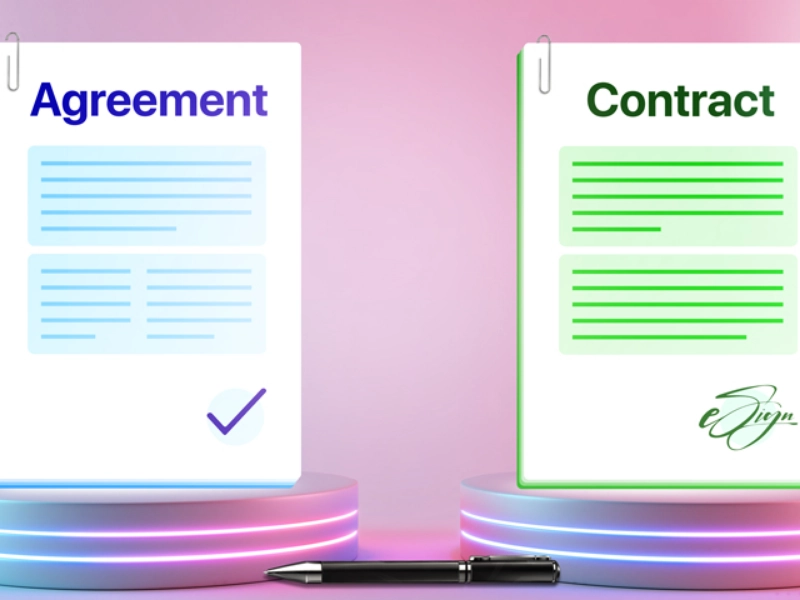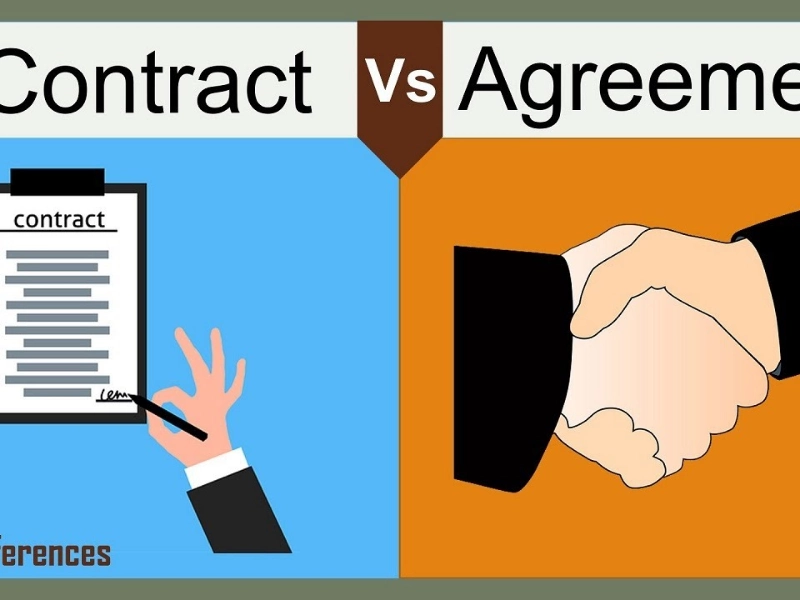Recognizing the Distinctions Between Agreements and Contracts
Building trustworthy business partnerships requires an understanding of the distinctions between agreements and contracts. The slight variation between the two words allows parties to modify their respective provisions in response to evolving situations, which expedites the resolution of disputes. Business contracts specify the conditions and parameters of a particular transaction, including roles, objectives, deadlines, and expectations. In the event that they are broken, they are enforceable by law.
Definition
 The conditions of a commercial agreement, including its anticipated duration, are specified in business contracts. In order to facilitate dispute resolution, they also specify each party's obligations, liabilities, and risks. Contracts can aid in removing uncertainty and miscommunication by outlining the completion dates of tasks.
In addition, they offer firms legal safeguards, guaranteeing their enforcement in civil courts. Specific legal requirements apply to contracts, including the need for signatures and evidence of each signatory's capacity to accept the conditions.
Franchise agreements and letters of intent are examples of business contracts. To improve your contract management process, find out more about these various kinds and how they work in various situations.
The conditions of a commercial agreement, including its anticipated duration, are specified in business contracts. In order to facilitate dispute resolution, they also specify each party's obligations, liabilities, and risks. Contracts can aid in removing uncertainty and miscommunication by outlining the completion dates of tasks.
In addition, they offer firms legal safeguards, guaranteeing their enforcement in civil courts. Specific legal requirements apply to contracts, including the need for signatures and evidence of each signatory's capacity to accept the conditions.
Franchise agreements and letters of intent are examples of business contracts. To improve your contract management process, find out more about these various kinds and how they work in various situations.
Objective
 Business agreements and contracts are essential for establishing new connections, formalizing current ones, and completing transactions. Their enforceability is a crucial component that provides protection for all parties involved and cultivates an atmosphere that is ideal for forward-thinking commercial transactions.
Employment contracts, rental agreements, supplier agreements, service agreements, non-disclosure agreements, and partnership agreements are all frequently governed by contracts. Every kind of business contract serves a distinct function, and companies may make better use of them if they have a thorough grasp of their importance.
Business agreements and contracts are essential for establishing new connections, formalizing current ones, and completing transactions. Their enforceability is a crucial component that provides protection for all parties involved and cultivates an atmosphere that is ideal for forward-thinking commercial transactions.
Employment contracts, rental agreements, supplier agreements, service agreements, non-disclosure agreements, and partnership agreements are all frequently governed by contracts. Every kind of business contract serves a distinct function, and companies may make better use of them if they have a thorough grasp of their importance.
Range
 Agreements and contracts for commercial use are vital resources. They serve as a genuine foundation for corporate partnerships and promote transactional transparency. Many individuals find it difficult to distinguish between an agreement and a contract, but being aware of the seven frequent clauses and the five fundamental components of a business contract will help you make sense of these important papers.
A legally enforceable agreement between parties serving a particular legal function is called a contract. A contract needs to be well-defined and legally binding. This means that a contract cannot impose requirements that are not allowed by law or require the parties to commit crimes. A confirmation that the parties to a contract are aware of and able to comprehend its terms must also be included.
Agreements and contracts for commercial use are vital resources. They serve as a genuine foundation for corporate partnerships and promote transactional transparency. Many individuals find it difficult to distinguish between an agreement and a contract, but being aware of the seven frequent clauses and the five fundamental components of a business contract will help you make sense of these important papers.
A legally enforceable agreement between parties serving a particular legal function is called a contract. A contract needs to be well-defined and legally binding. This means that a contract cannot impose requirements that are not allowed by law or require the parties to commit crimes. A confirmation that the parties to a contract are aware of and able to comprehend its terms must also be included.
Adaptability
 A contract's flexibility enables parties to modify its terms in response to evolving situations. Because of this flexibility, there may be fewer expensive and time-consuming renegotiations or terminations required. It can also increase productivity and teamwork.
Flexibility, however, can also lead to uncertainty and misunderstanding over the extent of modifications to a contract and the process of negotiating them. Conflicts and arguments may result from this, particularly if it's unclear how changes will be made. To guarantee that all sides comprehend one another's viewpoints and work toward a compromise, effective communication is crucial.
A contract's flexibility enables parties to modify its terms in response to evolving situations. Because of this flexibility, there may be fewer expensive and time-consuming renegotiations or terminations required. It can also increase productivity and teamwork.
Flexibility, however, can also lead to uncertainty and misunderstanding over the extent of modifications to a contract and the process of negotiating them. Conflicts and arguments may result from this, particularly if it's unclear how changes will be made. To guarantee that all sides comprehend one another's viewpoints and work toward a compromise, effective communication is crucial.
Implementation
 Business agreements and contracts can be enforced in a number of ways in the event that they are broken. These include taking legal action, mediating or arbitrating disputes, damaging one's reputation in public, severing a business connection, or even just missing out on potential future sales.
Contracts must fulfill a number of essential conditions in order to be enforceable in court. These consist of an offer and acceptance, capability (the parties must be of sound mind and fully understand what they are committing to), and consideration (a monetary payment from one party to another). Contracts must also be signed by someone with the appropriate power, such as an authorized officer of a corporation, and they must not be the subject of coercion or undue influence. Putting these components in place will guarantee the efficacy and enforceability of your contracts.
Business agreements and contracts can be enforced in a number of ways in the event that they are broken. These include taking legal action, mediating or arbitrating disputes, damaging one's reputation in public, severing a business connection, or even just missing out on potential future sales.
Contracts must fulfill a number of essential conditions in order to be enforceable in court. These consist of an offer and acceptance, capability (the parties must be of sound mind and fully understand what they are committing to), and consideration (a monetary payment from one party to another). Contracts must also be signed by someone with the appropriate power, such as an authorized officer of a corporation, and they must not be the subject of coercion or undue influence. Putting these components in place will guarantee the efficacy and enforceability of your contracts.











